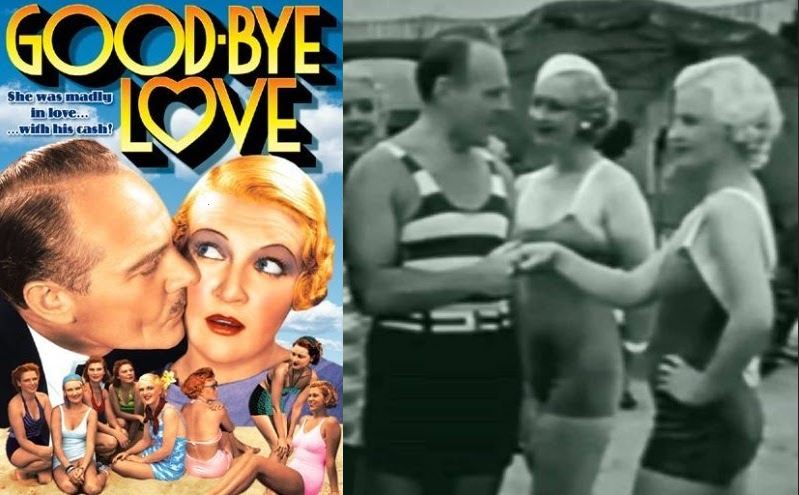 |
| Charles Ruggles surrounded by bathing beauties in Goodbye Love. |
The flick: Goodbye Love (RKO Radio Pictures, 1933) [buy the set]
Current IMDb rating: 5.1
Director: H. Bruce Humberstone (I Wake Up Screaming, several Charlie Chan films)
Actors of note:
- Charles Ruggles (Bringing Up Baby, The Parent Trap, TV's Aesop and Son)
- Verree Teasdale (A Midsummer Night's Dream)
- Sidney Blackmer (Rosemary's Baby, High Society)
- Mayo Methot (Mr. Deeds Goes to Town)
- Ray Walker (It's a Wonderful Life)
- Edward Van Sloan (Frankenstein, Dracula, The Mummy)
- Hattie McDaniel (Gone With the Wind, Song of the South)
The gist of it: A bumbling butler (Ruggles) needs some cash to get out of "alimony jail," where his embittered ex-wife has placed him for nonpayment. His wealthy stockbroker boss (Blackmer), a fellow "alimony jail" inmate, advances him $2500 on his salary. The butler, though, gives merely a month's alimony to his ex (an enormous, ill-tempered woman) and spends the rest on a seaside vacation at a rather fancy resort where he passes himself off as a millionaire and big game hunter, attracting the attention of a ruthless golddigger. This very same golddigger, it turns out, is also engaged to the butler's boss, the stockbroker! Several marriages and divorces occur among the cast members before the whole mess is sorted out.
The flick is nothing special from a technical standpoint with merely adequate direction, but it looks acceptable for what it is, considering its age and budget. Goodbye Love would work just as well as a stage play. The acting, writing, and plot carry it off nicely, though. Movie buffs will almost certainly recognize two very familiar performers in the supporting cast. First is a pre-Gone With the Wind Hattie McDaneils, playing yet another Mammy-type maid. Classic horror fans, though, will likely be more interested in Edward Van Sloan, a character actor who had appeared in Universal's Frankenstein and Dracula. Here, he's a genial justice of the peace who presides over a couple of chaotic wedding ceremonies and has to look bemused at the wacky goings-on.
 |
| Aesop and Son: A prestigious credit for Charles Ruggles. |
The script for Goodbye Love is very sharp with lots of witty one-liners that I will not spoil by repeating them here. Just watch the flick and discover them yourself. The script, while often formulaic, goes off on some admirably weird tangents, too. When the stockbroker's greedy first wife confronts the even-greedier golddigger, for instance, I thought they'd just squabble a little. Instead, they get rip-roaring drunk together (this was only a few months after the end of Prohibition) and plot against their mutual target. Then, there's the scene in which the stockbroker gets thrown in jail. It plays out almost like the middle section of Goodfellas, when Henry Hill and his fellow mobsters go to prison and their biggest concern is how thin their onions should be sliced at dinnertime. Goodbye Love's version of jail is basically a men's supper club, where divorced deadbeats gather around a long table as they feast and sing silly songs about their ex-wives.
Goodbye Love is in no way a perfect picture. The energy sags when Ruggles is off-screen for too long. Meanwhile, the stockbroker is a very dull and lifeless character, and there's an all-too-obvious subplot about his personal secretary, a trustworthy brunette who pines for her employer as he marries one shrewish blonde after another. But all in all, this is by far the best flick I've seen in this project.
My grade: A-
P.S. - It is now clear that I will have to keep a running tally of the negative Negro stereotype characters in these films. Colonel Effingham's Raid had one. Freckles Comes Home had two more. And Goodbye Love has three!
